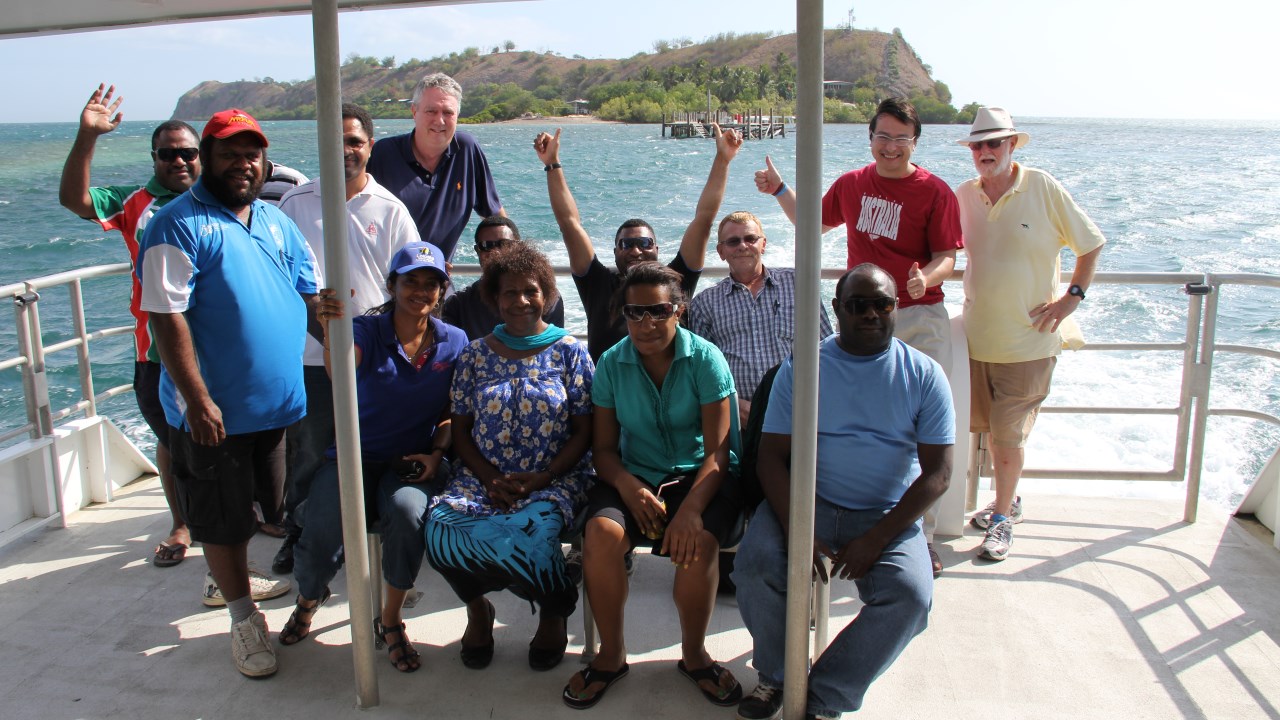Twinza’s main asset is the Pasca A field in the Gulf of Papua, offshore Papua New Guinea. Since this asset is being actively developed, it was only a matter of time before my first visit to the country. During November 2014 Twinza held a workshop with members of the Department of Petroleum and Energy (DPE), the Department of Environment and Conservation (DEC) and our JV partner Petromin.
First Impressions
Arriving at Port Moresby, PNG’s capital sitting, and looking out across the airfield, the first sight that greets you is one of rolling hills sparsely covered with trees. It’s a scene not that different to northern country New South Wales in Australia where my wife is from, and in the ensuing days that I spent in PNG it’s a view that only strengthened. In addition to the similarities in the environment, it’s the small things that resonate. The number plates on cars are similarly styled, there is a strong following for rugby (both codes) and the local beer is referred to as a ‘stubbie’.
Over the weekend we spent time on Loloata Island, a small resort off the coast of Port Moresby. This small island rises out of the crystal clear ocean waters, and is surrounded by reefs abundant with marine life. Some of the fauna we encountered has a startling similarity to that found on the Australian mainland, including what appear to be small kangaroos and cassowaries. Then again this should not be too surprising given that Australia and PNG are believed to have been once connected by a land bridge.

I’ve always maintained that when it comes to holiday destinations, there are two kinds of people: “Beach” people and “Mountain” people. The beach contingent would rather spend their time lazing on a warm beach, perhaps punctuated with brief dips in the blue ocean, before retiring over several beers or wine to an evening that starts with a blazing red sunset. The mountain types are the active ones. Enjoyment is not just the endless vista at the top of a mountain peak, but overcoming the challenges involved in getting there in the first place. PNG is one of those wonderful countries that manages to give both, with steep hills rising right out of the ocean, and continuing to rise inland to over 4,000 metres. As a self-professed mountain man, an idea to climb the highest peak in PNG with my good friend Erick has already been discussed.
With that introduction to the country it’s hard not to like it. The people are friendly and those that I met are possibly even more sports mad than their Australian neighbours. It’s a large country and I’ve barely scratched the surface, but I look forward to spending more time here in the future.
A Country On The Move
Recently the ExxonMobil-led PNG LNG project delivered its first cargo. This is a momentous occasion for a country that has an abundance of gas resources but no major domestic gas demand. Without a catalyst for economic development, the gas resource would likely remain stranded, as indeed it has been for many decades. These are still very early days, and at the time of writing PNG landowners were still awaiting their first share of revenue from the project. Nonetheless, it is certain to lead to a step change in the country’s fortunes in the years ahead.
With the successful delivery of the PNG LNG project, the attention of the government now turns to the other resources in the country. Strangely the PNG LNG does not supply any domestic gas to PNG. By some estimates the flare alone on many days burns more energy than would be needed to fuel the turbines at the local Port Moresby power station. Furthermore the turbines are dual fuel capable and currently burn very expensive imported diesel. Logic would suggest that the supply of some gas to generate power for Port Moresby (which suffers regular blackouts) would be a sensible disposal option for the heavier hydrocarbons removed from the gas to meet export specifications, instead of flaring. This logic is not lost on many people in PNG, where there is some resentment towards ExxonMobil for its heavy-handed negotiating tactics. Then again this is a complaint frequently levelled at ExxonMobil, which is at the very least exhibiting consistency in its practices around the world.
So the scene has been set for subsequent gas developments in the country. Following in ExxonMobil’s footsteps will not be easy as expectations have been set that projects are delivered on time, budget and work as planned. Furthermore PNG will be keen to learn from their first major gas development, and are unlikely to be as accommodating with respect to weak to non-existent domestic gas plans. Without giving too much away this, the options for domestic gas supply were a notable discussion point during Twinza’s recent workshop. The challenge is for the Pasca A Project to go one step better than PNG LNG: to deliver a successful project that meets all its objectives, including an element that benefits the host country. Should be easy?
